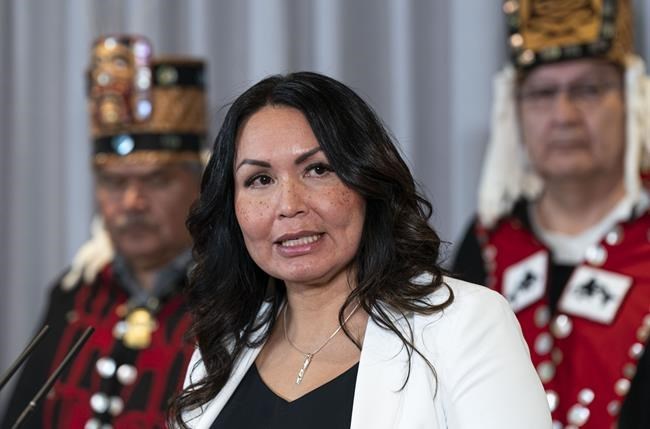VICTORIA — The Haisla First Nation on British Columbia's northern coast has been granted a provincial environmental assessment certificate for a floating liquefied natural gas facility.
The B.C. government said Tuesday the nation, in partnership with Pembina Pipeline Corp., proposes to use electricity to operate the LNG facility and export terminal.
The $3.28-billion terminal will be supplied with natural gas from the Coastal GasLink pipeline, which is still under construction.
A statement from the province said Environment Minister George Heyman and Energy Minister Josie Osborne made their decision after considering a report by the Environmental Assessment Office.
The ministers say in a joint statement that the Haisla majority-owned project takes "all possible measures currently available to reduce greenhouse gas emissions to the lowest feasible level."
The announcement came on the same day the B.C. government released its new energy action framework to make sure oil and gas sector projects fit with its climate commitments.
Under the new framework, all proposed LNG facilities must pass an emissions test with a credible plan to be net zero by 2030.
Heyman and Osborne said they agreed that the Cedar LNG project supports reconciliation with the Haisla Nation, and that they received letters of support or no opposition from several surrounding First Nations.
Crystal Smith, the chief councillor for the Haisla Nation, said in a statement the approval is a historic step toward their economic self-determination.
"Together with our partner Pembina Pipeline, we are setting a new standard for responsible and sustainable energy development that protects the environment and our traditional way of life."
The government release said the Cedar LNG project will have an expected export capacity of three million tonnes a year, employing 500 people during construction and 100 people when it's in operation.
The project will also need a federal impact assessment, and provincial permits and other authorizations before construction can start.
B.C.'s Environmental Assessment Office recommended 65 federal mitigation measures and nine followup programs to address potential impacts from the project in areas of federal jurisdiction, including marine shipping, marine emergency response and greenhouse gas emissions.
Ellis Ross, the Skeena member of the legislature and a former chief councillor for the Haisla, said in a statement the Indigenous-owned project is one of the greatest examples of economic reconciliation in the province.
"A glaring issue in this approval is whether British Columbia has the electrical infrastructure needed for the turbines that are supposed to power this plant,” said Ross, who is a member of the Opposition BC Liberals.
He said the project has many more hurdles to overcome and the current wait for permits is "unacceptable."
"Cedar LNG will likely be waiting a very long time for further approvals which will further slow down this project, similar to the wait that LNG Canada is facing."
LNG Canada is building a terminal nearby in Kitimat's port for the liquefaction, storage and export of LNG.
Environmental group the Wilderness Committee pointed to Premier David Eby's own statements to ask if climate commitments really matter to the government.
Eby said shortly after becoming leader of the B.C. New Democrats that the province can't continue to expand fossil fuel infrastructure and reach its climate goals.
The committee's climate campaigner Peter McCartney said the province can't claim new fossil fuel projects fit into its plan to reduce emissions.
"All the greenwash around B.C. LNG doesn’t change the fact that every new facility takes us further away from meeting our commitments.”
This report by The Canadian Press was first publishedMarch 14, 2023.
The Canadian Press



